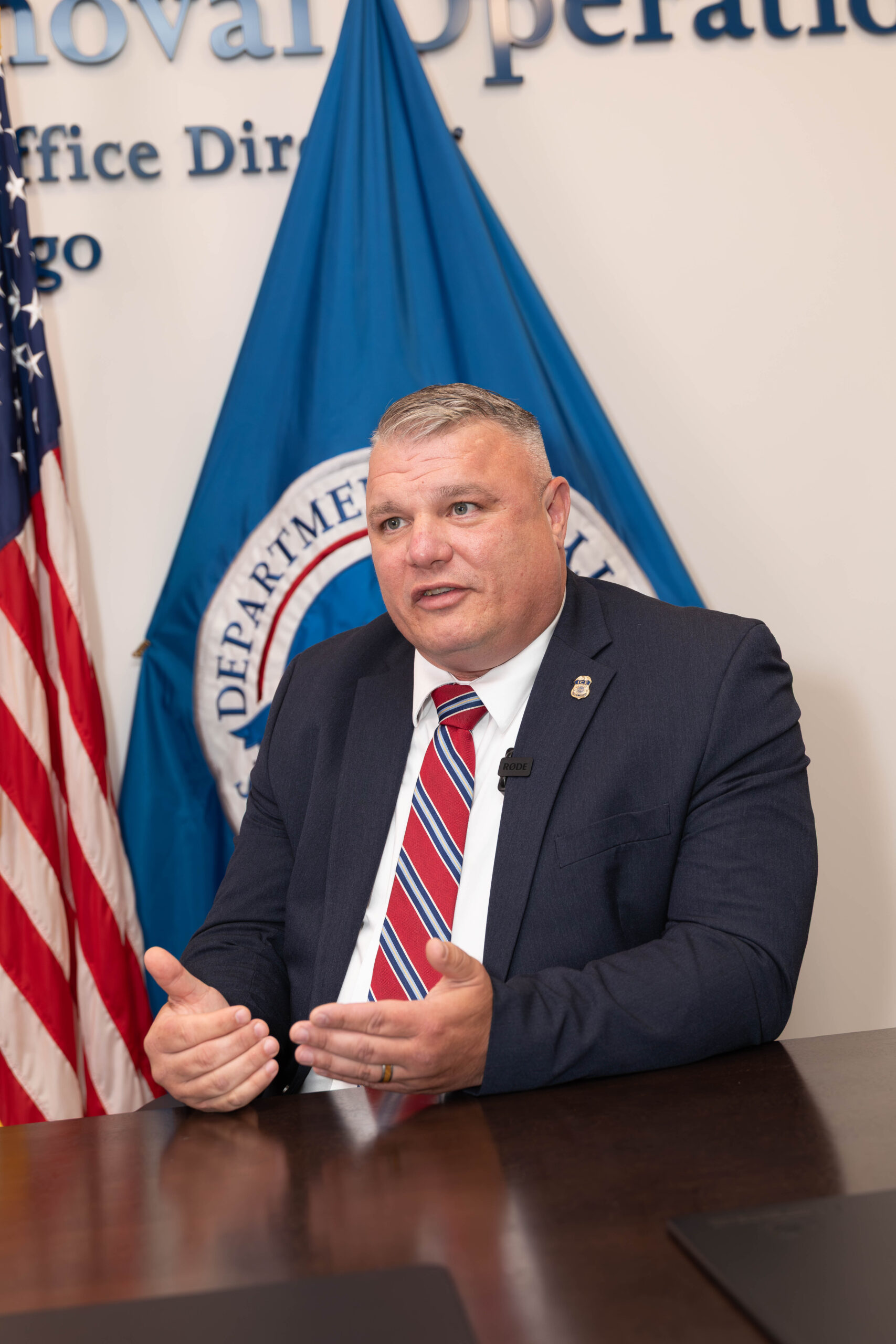You’ve seen the viral videos: ICE officers in tactical gear making arrests. The outrage comes just as quickly. Activists and politicians take to Instagram and X, calling federal officers “Nazis,” “terrorists,” and the “Gestapo.” Protesters claim ICE agents are kidnapping parents at schools and hospitals, separating families.
But what’s the truth behind the headlines? To find out, IW Features sat down for an exclusive interview with Patrick Divver, the Field Office Director for Enforcement and Removal Operations (ERO) in San Diego, the top official overseeing ICE’s arrests, detention, and deportations across the region. Or as his agents call him, Number 1. His perspective offers a sobering counterpoint to the political rhetoric you hear on the nightly news.
“The mission of ICE is simple,” Divver explained. “We safeguard our borders and safeguard the integrity of the immigration program. If someone is in the interior of the United States illegally, it’s our job to apprehend, arrest, and remove them. That’s the law—and it hasn’t changed since 1996.”


Divver doesn’t shy away from addressing the harshest accusations against ICE. “Many activists call ICE agents kidnappers or Gestapo,” he said. “That rhetoric is dangerous. It empowers our targets and the general public to think that’s what we’re doing. It’s not. We’re enforcing immigration law as written by Congress. But because of that misinformation, people have interfered with our arrests, putting themselves, my officers, and even the individuals we’re arresting in danger.”
In other words, what starts as a hashtag on social media can quickly escalate into a life-threatening situation on the streets. The Department of Homeland Security reports a staggering 1,000 percent increase in assaults against ICE agents nationwide. Divver says rhetoric is directly fueling that violence. “We all live here,” he added. “These are our neighborhoods, too. My officers go home every night to the same communities they’re working to protect. They’re not outsiders–they’re San Diegans.”
Critics argue ICE indiscriminately snatches people at bus stops or schools. Divver insists that’s false. “The majority of our arrests are targeted enforcement actions,” he explained. “That means we have information that a specific individual is in the country illegally. We’re going after that individual. Everyone arrested gets due process. It’s a misnomer to say they don’t.”
Recent arrests underscore the stakes. In just 90 days, Divver said ICE in San Diego has taken four convicted murderers off the streets, along with gang members from Logan Heights, the Oriental Killer Boys, and individuals convicted of aggravated assault and sex crimes.
Perhaps the most shocking case happened only weeks ago: ICE officers tracked down a convicted sex offender and unregistered gang member living inside a San Diego home daycare. “That man had a lengthy criminal record,” Divver said. “And he was living where children were cared for. My officers removed him. That’s a prime example of us protecting families and kids in this community.”
Divver emphasized that ERO’s work doesn’t stop at arrests. His office manages three detention facilities—Otay Mesa, Imperial Regional Detention Facility, and San Luis in Arizona—housing nearly 4,000 people daily. ERO also repatriates hundreds of individuals every week to their home countries.
Under new diplomatic agreements, countries once unwilling to accept deportees, like Vietnam and Laos, now cooperate. “In the past, we could have a removal order from a judge, but if a country refused to take someone back, that person could stay here,” Divver said. “That’s changing. Now they’re going home—and they’re not coming back to re-offend.”
California’s “sanctuary” law, SB 54, complicates ICE’s work. The law prevents local law enforcement from cooperating with federal agents in jails. “That means instead of safely transferring someone in custody, my officers have to go into neighborhoods to arrest them,” Divver said. “So instead of two officers making a safe handoff, I have to send a team of six or seven into the community. It doesn’t make anyone safer.”
The rhetoric from politicians adds another layer of difficulty. San Diego City Council member Sean Elo-Rivera has repeatedly used his social media to brand ICE agents as “fascists” and “terrorists.” Divver is concerned this kind of rhetoric fuels hostility. “It’s unfortunate,” he said. “We’re public servants enforcing laws Congress enacted. We’re not going to apologize for doing our job.”
One frequent demand from protesters is that ICE show warrants on the spot. Divver says they misunderstand the law. “Our officers operate under the authority Congress gave us,” he explained. “Administrative warrants for immigration violations carry the same legal weight as criminal warrants. 8 U.S.C. 1357 gives us the authority to make warrantless arrests when necessary. That’s codified in law.”
As for accusations of racial profiling, Divver was clear: “We don’t discriminate based on race, color, or creed. We determine alienage and removability. That’s it. Our detention facilities house people from all over the world—Russia, Senegal, Central America, Southeast Asia. The idea that we target one group is false.”With new federal funding from the One Big Beautiful Bill Act, ICE plans to hire 10,000 officers nationwide. Divver said this will mean more robust operations in San Diego. “We’ll have more resources to track down people with serious criminal records,” he said. “We’re here to make our community safer—one bad actor at a time.”
For Divver, it always comes back to the men and women in the field. “My officers are professionals,” he said. “They don’t do this job for glory. They get up every morning to do the public good, to make San Diego safer. And I couldn’t be more proud of them.”












